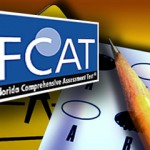Governor Scott Says Florida Students Might Face Too Much Testing

Joe Raedle / Getty Images News
Gov. Rick Scott says Florida students may be taking too many tests. But Scott says assessments are important to measuring school quality.
Gov. Rick Scott says Florida students might be tested too much, and is talking to teachers and education officials about what changes should be made to the Florida Comprehensive Assessment Test.
Scott’s made the comments Friday at a newspaper editor meeting, the Associated Press reported.
Testing is important to measure quality, Scott said, but the state must find balance. From the story:
“Parents and taxpayers expect measurement. We’ve got to measure, we’ve to find out who the best schools are,” Scott said. “We have to have a good measurement system but we have to make sure we don’t have too much of it.”
He said among the FCAT, federal testing and end-of-course exams, students might be tested too much. He said he is talking to officials and teachers about what changes should be made.
“In the end, I think it’s going to change a lot,” he said.
Scott’s comments are the first sign that any state leader is reconsidering the FCAT following a public relations crisis for the test this spring.
State leaders raised standards on the FCAT writing exam, which caused scores to plunge. Last year 81 percent of Florida fourth graders scored a ‘4’ or better (out of 6) on the writing test. This year just 27 percent of fourth graders earned a ‘4’ or better.
Parents, educators and school board members were outraged.
In response, the state Board of Education lowered the score needed to pass the exam this year.
Since then school board have been in open revolt against the test, with more than a dozen Florida districts and the Florida School Boards Association approving a resolution asking for less emphasis on the FCAT and other “high-stakes” testing.
“Now is not the time to focus on a future tapered by fear of so-called high stakes assessments,” Robinson said in a June statement, as Florida works to develop the Common Core standards and tests which will replace FCAT beginning in the 2014-2015 school year.
Education Commissioner Gerard Robinson and allies, such as the Foundation for Florida’s Future, have tried to counter the FCAT backlash. Robinson said the FSBA resolution was “short on providing hope to schoolchildren.”
Fund Education Now, a group of Orlando parents who have opposed many of Florida’s education reforms, cheered Scott’s comments. But they urged the governor to also speak with parents.
“Governor Scott should also be talking with the engaged and empowered parents of Florida,” group co-founder Linda Kobert said in a statement. “He says he’s talking with state education officials, school superintendents and teachers about making changes. Scott needs to remember that parents were the first to question high-stakes testing.”
Also weighing in this weekend was the Beacon Council, a Miami-area economic development group. The group’s CEO, Frank Nero, is a former teacher who argued the rapid changes to FCAT contribute to an inaccurate public perception of state schools. From his column in the Miami Herald:
But now Florida schools are going to suffer because the Florida Department of Education (FLDOE) has rushed to push through untested accountability reforms, which will result in school performance grades that do not accurately reflect school and student performance levels.
After years of steadily improving FCAT results, parents and other stakeholders will likely be shocked and confused when, as predicted by many, school grades actually decrease based on the new, more rigorous and recently revised school grading formula. More than three-quarters into the school year, in fact, after the 2012 FCAT administration had already commenced, Florida raised the bar on its definition of “achievement.” The state included students who in the past, because of disability or lack of language proficiency, had been afforded more time to achieve parity with their grade level peers.
For example, the scores of students who have been learning English for just one year will help to determine schools’ performance grades. Both common sense and research suggest that these students’ test scores reflect their knowledge of English rather than their actual mastery of subject area content, knowledge and skills.
The Beacon Council, together with school district leaders and educators, are concerned about the speed in which these changes have occurred. Recently, several school boards and a number of educational organizations around the state have passed resolutions opposing standardized testing.


